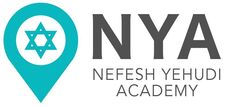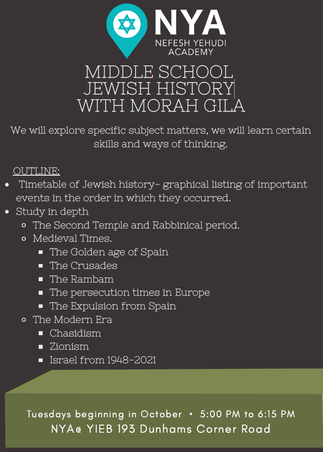About Us
Nefesh Yehudi Academy was created in 2012-2013 to sustain Jewish identity and culture for those students enrolled at Hatikvah International Academy Charter School and their immersive Hebrew language program. NYA is a four-day-a-week program that meets after school, bussing students directly from Hatikvah to NYA. Our program is housed at the Young Israel of East Brunswick.
The program has grown, and our reputation is excellent. We receive many calls from prospective parents who are hoping their children receive a coveted “spot” in Hatikvah, whose waiting list is over 300. Many Jewish parents, seeking a spot in Hatikvah for the excellent secular education and well-regarded Hebrew immersion curriculum, struggle with difficult decisions regarding their children’s Jewish education. NYA has become a viable option for Jewish parents of all denominations who seek to supplement their children's Jewish education.
The program has grown, and our reputation is excellent. We receive many calls from prospective parents who are hoping their children receive a coveted “spot” in Hatikvah, whose waiting list is over 300. Many Jewish parents, seeking a spot in Hatikvah for the excellent secular education and well-regarded Hebrew immersion curriculum, struggle with difficult decisions regarding their children’s Jewish education. NYA has become a viable option for Jewish parents of all denominations who seek to supplement their children's Jewish education.
| Click here for our 2024-2025 Calendar! | |
| File Size: | 177 kb |
| File Type: | |
Our Program
1. What is Nefesh Yehudi Academy?
NYA is an after-school educational program designed to provide Jewish programming for students who attend a Hebrew-language charter school.
2. Is your program associated with any specific synagogue or other Jewish program? Is it designed for any specific Jewish denomination?
NYA is an independent educational organization run by its own board of directors consisting of parents and non-parents with backgrounds in education. We are not run or managed by any other organization. It is a guiding principle of NYA that we offer Jewish education in a manner that welcomes families who have many different approaches to practicing Judaism. As such, our program does not espouse any single approach as being the “correct” manner to practice Judaism.
Given that NYA does not affiliate with any particular denomination, our goal is to provide children with multifaceted opportunities to engage with Jewish learning and culture. Lessons familiarize students with Jewish values, history, and holidays in an open and inclusive environment which recognizes and respects the myriad ways in which to connect with, and celebrate, one’s Judaism. Additionally, NYA hosts a number of social and educational extracurricular activities that include our students’ families in order to enhance the NYA experience and foster a feeling of community among its participants.
Finally, our faculty and staff all believe it is beyond their call to serve as a “rabbi” to any student. If personal religious questions arise, NYA staff will encourage speaking with a religious leader or rabbi.
3. What is taught during a typical afternoon at NYA?
The NYA curriculum is designed to cultivate our students’ connection with their Judaism through engagement with topics including (but not limited to): Jewish values, history, holidays, traditional texts, and the State of Israel. Each year’s curriculum is designed to provide age-appropriate opportunities to explore facets of Judaism, from traditional prayers to artistic, hands-on interpretations of the weekly Torah portion. Students in Kindergarten may spend time considering, “What is a mitzvah?” (colloquially translated as ‘good deed’), first graders may be acting out stories from the parsha (weekly Torah portion), and fifth graders may be discussing the connection between the Holocaust, Zionism, and the creation of the State of Israel. The goal of NYA is to support students as they grow and explore the rich, extensive history of Judaism and the Jewish people. We teach love for holidays, Israel, Zionism, and fellow Jews in a manner which acknowledges and respects the diverse approaches to practicing Judaism within our community.
4. I always assumed Jewish learning meant studying Jewish texts. How, if at all, does that fit into the NYA curriculum?
Part of a Jewish education involves an understanding of classical Jewish literature and writings. Each grade at NYA approaches text study in varying ways in order to promote and facilitate active engagement with the material. For example, second graders often act out scenes from the parsha (weekly Torah portion) and construct art projects in order to make the stories come alive in the classroom. Third graders focus on ways to decode and decipher biblical text to sharpen their textual analysis skills, and fourth graders apply these skills as they create a character study of Joseph, and his journey in the Book of Genesis. NYA’s overall approach to studying Jewish texts provides students with opportunities to actively engage with the writings; the Torah is a friend in the classroom with whom the students can interact and make meaning.
5. Do you teach Hebrew?
Our program does not specifically teach Hebrew. Our curriculum is designed for students who are attending a Hebrew-immersion charter school during the day and learning Hebrew there.
6. How is a typical afternoon structured?
Classes are typically held Mondays through Thursdays. Students arrive by bus from the local Hebrew-language charter school and are settled into class by 3:35 p.m., and the formal programming runs until 4:50 p.m.
7. What sort of facilities do you have?
Nefesh Yehudi is housed in spaced leased within Young Israel of East Brunswick. Our program has access to multiple classrooms, a social hall, sanctuary, playground and other facilities.
8. My child does not attend a Hebrew immersion charter school. Can he/she attend?
Nefesh Yehudi is a distinctive program designed to capitalize on the Hebrew language skills that its students have already acquired through a Hebrew-immersion charter school and to build on that foundation. Most public schools, even ones offering Hebrew classes, do not provide the same sort of Hebrew curriculum that we expect our students to have attained. A child who goes to a regular public school may attend our program, but at the discretion of the parents, since it may not be the right fit for your child.
9. Can I visit your facility?
We would be happy to host visits to our school. Please contact our office at [email protected] or 732-692-8201 to schedule your visit.
10. Who can I contact if I want to find out more information?
Please don't hesitate to contact us at [email protected] or click here for our Contact Us page.
NYA is an after-school educational program designed to provide Jewish programming for students who attend a Hebrew-language charter school.
2. Is your program associated with any specific synagogue or other Jewish program? Is it designed for any specific Jewish denomination?
NYA is an independent educational organization run by its own board of directors consisting of parents and non-parents with backgrounds in education. We are not run or managed by any other organization. It is a guiding principle of NYA that we offer Jewish education in a manner that welcomes families who have many different approaches to practicing Judaism. As such, our program does not espouse any single approach as being the “correct” manner to practice Judaism.
Given that NYA does not affiliate with any particular denomination, our goal is to provide children with multifaceted opportunities to engage with Jewish learning and culture. Lessons familiarize students with Jewish values, history, and holidays in an open and inclusive environment which recognizes and respects the myriad ways in which to connect with, and celebrate, one’s Judaism. Additionally, NYA hosts a number of social and educational extracurricular activities that include our students’ families in order to enhance the NYA experience and foster a feeling of community among its participants.
Finally, our faculty and staff all believe it is beyond their call to serve as a “rabbi” to any student. If personal religious questions arise, NYA staff will encourage speaking with a religious leader or rabbi.
3. What is taught during a typical afternoon at NYA?
The NYA curriculum is designed to cultivate our students’ connection with their Judaism through engagement with topics including (but not limited to): Jewish values, history, holidays, traditional texts, and the State of Israel. Each year’s curriculum is designed to provide age-appropriate opportunities to explore facets of Judaism, from traditional prayers to artistic, hands-on interpretations of the weekly Torah portion. Students in Kindergarten may spend time considering, “What is a mitzvah?” (colloquially translated as ‘good deed’), first graders may be acting out stories from the parsha (weekly Torah portion), and fifth graders may be discussing the connection between the Holocaust, Zionism, and the creation of the State of Israel. The goal of NYA is to support students as they grow and explore the rich, extensive history of Judaism and the Jewish people. We teach love for holidays, Israel, Zionism, and fellow Jews in a manner which acknowledges and respects the diverse approaches to practicing Judaism within our community.
4. I always assumed Jewish learning meant studying Jewish texts. How, if at all, does that fit into the NYA curriculum?
Part of a Jewish education involves an understanding of classical Jewish literature and writings. Each grade at NYA approaches text study in varying ways in order to promote and facilitate active engagement with the material. For example, second graders often act out scenes from the parsha (weekly Torah portion) and construct art projects in order to make the stories come alive in the classroom. Third graders focus on ways to decode and decipher biblical text to sharpen their textual analysis skills, and fourth graders apply these skills as they create a character study of Joseph, and his journey in the Book of Genesis. NYA’s overall approach to studying Jewish texts provides students with opportunities to actively engage with the writings; the Torah is a friend in the classroom with whom the students can interact and make meaning.
5. Do you teach Hebrew?
Our program does not specifically teach Hebrew. Our curriculum is designed for students who are attending a Hebrew-immersion charter school during the day and learning Hebrew there.
6. How is a typical afternoon structured?
Classes are typically held Mondays through Thursdays. Students arrive by bus from the local Hebrew-language charter school and are settled into class by 3:35 p.m., and the formal programming runs until 4:50 p.m.
7. What sort of facilities do you have?
Nefesh Yehudi is housed in spaced leased within Young Israel of East Brunswick. Our program has access to multiple classrooms, a social hall, sanctuary, playground and other facilities.
8. My child does not attend a Hebrew immersion charter school. Can he/she attend?
Nefesh Yehudi is a distinctive program designed to capitalize on the Hebrew language skills that its students have already acquired through a Hebrew-immersion charter school and to build on that foundation. Most public schools, even ones offering Hebrew classes, do not provide the same sort of Hebrew curriculum that we expect our students to have attained. A child who goes to a regular public school may attend our program, but at the discretion of the parents, since it may not be the right fit for your child.
9. Can I visit your facility?
We would be happy to host visits to our school. Please contact our office at [email protected] or 732-692-8201 to schedule your visit.
10. Who can I contact if I want to find out more information?
Please don't hesitate to contact us at [email protected] or click here for our Contact Us page.


